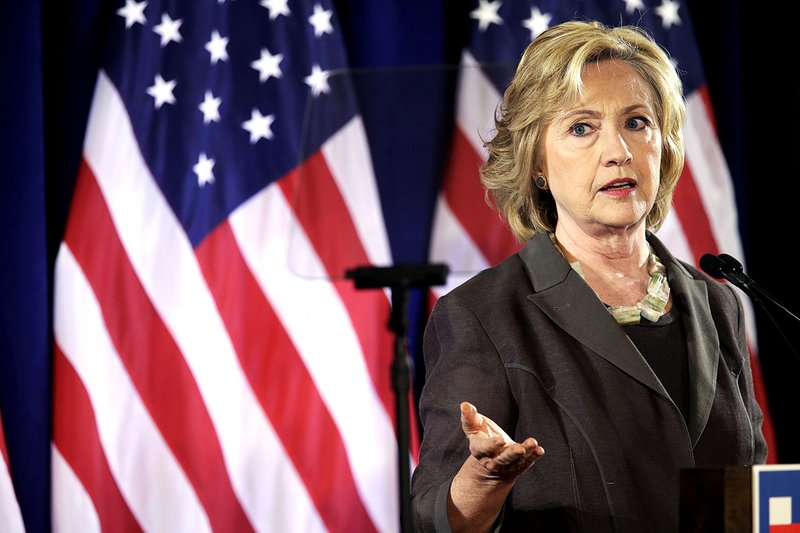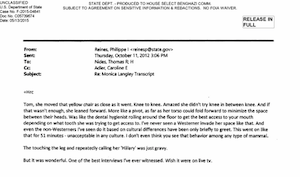WASHINGTON -- Former Secretary of State Hillary Rodham Clinton's personal email account contained some information that should have been classified and transmitted over a secure network, the U.S. intelligence community's inspector general has found.
The federal watchdog asked the FBI to review whether potentially classified material within Clinton's emails had been jeopardized during a State Department review of the documents, in preparation for releasing them publicly.
The official, I. Charles McCullough, also raised concerns that "potentially hundreds" of emails containing information that may be classified could still exist on both Clinton's private server and a thumb drive in possession of her attorney, David Kendall.
The intelligence community's referral is routine when federal investigators find evidence that classified information may have been sent using unsecured email.
"Our office is statutorily required to refer compromises of national security information," Andrea Williams, a spokesman for the inspector general's office, said in an email statement. Williams released a copy of McCullough's report summary that was shared with the top Republicans and Democrats on the House and Senate intelligence committees.
Officials stressed that the inspector general had not referred the issue as a possible criminal violation -- contrary to statements made, and then retracted, by Justice Department officials.
The intelligence inspector general "did not make a criminal referral -- it was a security referral made for counterintelligence purposes," McCullough and Steve Linick, the State Department's inspector general, said in a joint statement. The New York Times first reported on such a referral.
It was unclear whether Clinton had done anything wrong, since the review involved materials that had either been retroactively deemed classified or never properly marked.
Clinton, now a Democratic presidential candidate, has focused her campaign on economic issues she and her team believe will drive the next election. But they have been hounded by questions surrounding her decision to run her State Department correspondence through an unsecured system set up at her New York home.
Clinton has maintained that she never sent classified information on her personal email account, which she said in March she used as a matter of convenience to limit her number of electronic devices.
A spokesman on Friday said Clinton had "followed appropriate practices in dealing with classified materials."
"Any released emails deemed classified by the administration have been done so after the fact, and not at the time they were transmitted," campaign spokesman Nick Merrill said in a statement.
Clinton briefly addressed the issue at the start of an economic policy address she delivered Friday in New York. "There have been a lot of inaccuracies" in reports about the inquiries, she said. "Maybe the heat is getting to everybody."
She continued: "I have released 55,000 pages of emails; I have said repeatedly that I will answer questions.
"We are all accountable to the American people to get the facts right, and I will do my part but I'm also going to stay focused on the issues," she said.
It was not immediately clear whether the Justice Department would investigate the potential compromise highlighted by the intelligence inspector general. The office has not suggested any wrongdoing by Clinton, according to U.S. officials speaking on the condition of anonymity because they were not authorized to discuss the referral publicly.
Republicans are pressuring the Department of Justice to proceed with an investigation.
"Hillary Clinton's desire to play by her own rules may have further exposed classified information," said a statement from Republican National Committee Chairman Reince Priebus. "A full investigation by the Justice Department is not just needed, but required."
4 emails cited
None of the emails were marked as classified at the time they were sent or received, but some should have been handled as such and sent on a secure computer network, said the letter sent to congressional oversight committees.
"We note that none of the e-mails we reviewed had classification or dissemination markings, but some included [intelligence community]-derived classified information and should have been handled as classified, appropriately marked, and transmitted via a secure network," McCullough said.
The report said McCullough's office had sampled 40 of the 30,000 emails from the Clinton server and found that four contained classified intelligence community information that should have been marked and handled at the secret level. Material classified "top secret" is considered far more sensitive than that with the two lower levels: confidential and secret.
The referral by the intelligence community followed a June 29 memo that the inspector general and the State Department inspector general sent to Undersecretary of State Patrick Kennedy, saying that hundreds of emails in Clinton's private account may improperly contain classified material.
Other memos from the two officials said the State Department risked the release of potentially classified information if they did not take a series of steps, including requesting support from the intelligence community and Justice Department to help review the emails.
The State Department, in a series of response memos, has defended the current practice as sufficient in preventing the public disclosure of classified material.
State Department spokesman Mark Toner said Friday that the four emails cited by the intelligence inspector general weren't classified at the time.
"To our knowledge none of them needed to be," he said.
While steps taken by the State Department after those concerns were raised satisfied the concerns of the inspectors general, the watchdogs said they remained worried that the State Department was using a classified -- but not top secret -- system to handle the emails.
The officials also expressed concern that the State Department is serving as the final arbiter of whether emails were classified, saying that process may not sufficiently address the intelligence community's concerns. And, according to one of the memos, at least one piece of classified material was already publicly disclosed when the State Department made public 3,000 pages of Clinton's emails at the end of June.
The aim is for the department to unveil by Jan. 29, 2016, all 55,000 pages of the emails she turned over. A federal judge earlier this month chastised the department for moving too slowly in providing The Associated Press with thousands of emails via the federal Freedom of Information Act.
Information for this article was contributed by Justin Sink, Del Quentin Wilber and Jennifer Epstein of Bloomberg News; by Lisa Lerer, Eric Tucker, Jack Gillum, Matthew Lee and Ken Dilanian of The Associated Press; and by Evan Halper, Paul Richter and Brian Bennett of Tribune News Service.
A Section on 07/25/2015


